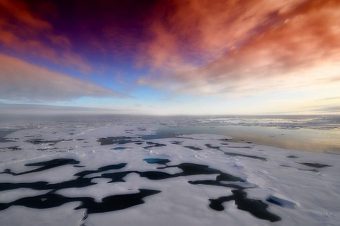
The first portion of the 2017 Hudson Bay System Study in the Arctic, part of the 2017 Canadian Research Icebreaker CCGS Amundsen Expedition, has been cancelled due to climate change–induced hazardous sea ice conditions.
In other words, a study focused on the study of climate change in the Arctic has now been cancelled because of climate change in the Arctic.
To be more exact, though, the cancellation is “due to complications associated with the southward motion of hazardous Arctic sea ice, caused by climate change.” In other words, the dangerous sea ice conditions would mean that the ship journey would take too long for the researchers to get to the site with enough time remaining to achieve their research goals.
A press release provides more: “This year the Expedition Logistics and Science Teams accelerated the mobilization of the 2017 Arctic Expedition to permit departure of the Amundsen six days ahead of schedule. This would allow CCG to carry out critical marine safety and security operations in the unusually severe ice conditions in the Strait of Belle Isle and along the northeast coast of Newfoundland before beginning the Science Mission.
”Unfortunately, the conditions required much more extended support than anticipated. Fleet management issues and inadequate alternative ships forced the cancellation of the science program due to significant safety concerns.”
“Considering the severe ice conditions and the increasing demand for Search And Rescue operations (SAR) and ice escort, we decided to cancel the BaySys mission. A second week of delay meant our research objectives just could not be safely achieved – the challenge for us all was that the marine ice hazards were exceedingly difficult for the maritime industry, the CCG, and science,” commented Dr David Barber, Expedition Chief Scientist and BaySys Scientific Lead.
As we’ve reported many times in recent months and years, the Arctic is rapidly undergoing massive changes — with sea ice disappearing quickly, temperatures climbing rapidly, and positive feedback loops involving the release of methane starting to take off. As these changes continue, far more than simple research expeditions will be affected. …
Source: cleantechnica.com



